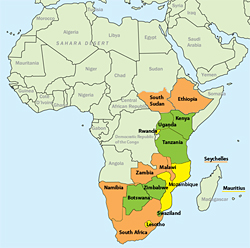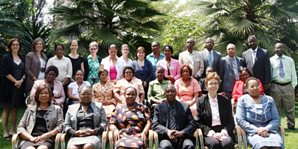Strengthening the African Health Workforce

ARC - Where we work: Click on the image to view the interactive map, or download a PDF with ARC Map details.
To help meet new HIV treatment and prevention targets announced on World AIDS Day 2012, the U.S. President Emergency Plan for AIDS Relief (PEPFAR) is working to strengthen the African health workforce.
The CDC’s four-year initiative, the African Health Profession Regulatory Collaborative for Nurses and Midwives (ARC)builds the capacity of national nursing and midwifery regulatory councils to update and strengthen professional regulation. Updated nursing and midwifery regulations can help in scaling-up HIV services to reach the World AIDS Day targets1,2. ARC uses a unique, collaborative approach that entails convening regional meetings or “Learning Sessions,” awarding short-term grants, and providing targeted technical assistance (see box).
A Model Approach for Collaboration
The collaborative approach used by ARC is adapted from the Institute for Healthcare Improvement (IHI) “Breakthrough Series” model for quality improvement collaboratives. (The Breakthrough Series: IHI’s Collaborative Model for Achieving Breakthrough Improvement. IHI Innovation Series white paper. Boston: Institute for Healthcare Improvement; 2003.)
The structure of the IHI model is a series of alternating Learning Sessions and Action Periods. During the Learning Sessions, teams from participating organizations come together to learn about and discuss the chosen topic and plan changes to implement in their home institutions. During the Action Periods, the teams return to their home institutions and work together on the planned actions for change.
At the conclusion of the collaborative cycle, participating organizations engage in a Summative Congress to share lessons learned and produce publications to disseminate their breakthrough improvements.
Building a “south-to-south” partnership
The ARC initiative is funded by CDC through PEPFAR, and is implemented in partnership with the Commonwealth Secretariat (based in the UK), the Lillian Carter Center for Global Health & Social Responsibilityat Emory University, and the East, Central and Southern Africa Health Community—an intergovernmental regional coordinating body on health issues. Through this initiative, national nursing and midwifery leadership teams work together to improve professional regulation in the east, central, and southern Africa (ECSA) region.
ARC is unique in that it supports regulation improvement projects which are developed, proposed, and implemented by the national nursing and midwifery leadership teams. By emphasizing south-to-south collaboration and sharing of resources, ARC not only advances rapid scale-up of regulatory reform in the region, but also builds long-term capacity among African professional institutions, resulting in stronger health systems for years to come.
ARC Year 1 activities
The inaugural ARC regional meeting of 14 nursing and midwifery leadership teams was held in Nairobi, Kenya in February 2011. Country teams discussed professional practice and regulatory issues of national and regional importance, such as task shifting, pre-service accreditation, scope of practice, and continuing professional development. The ARC short-term grant program funded five country teams to implement a project to help address a national regulatory priority over the course of one year (see map). Targeted technical assistance was provided to three additional country teams to help ensure progress on their regulation strengthening priority. The five countries funded during ARC Year 1 have been invited to publish a manuscript detailing their ARC regulation improvement projects in the African Journal of Midwifery and Women’s Health, a peer-reviewed journal.
ARC Year 2: Summative Congress 2012

ARC held its Summative Congress June 20-22nd, 2012 in Johannesburg, South Africa. The Summative Congress involves all ARC countries and marks the end of the past ARC cycle and the beginning of a new ARC cycle.
Three new countries attended the Summative Congress this year, bringing the total number of countries involved in ARC to 17. The meeting was opened by the Deputy Director General of the South Africa Department of Health and included sessions on continuing professional development, global guidelines for education and practice, nurse-initiated HIV care, prevention of mother-to-child transmission of HIV, and challenges related to task shifting.
The 2012 Summative Congress showcased the regulatory improvements made by the five countries that received ARC grants in Year 1 and announced the grant recipients for ARC Year 2: Botswana, Kenya, Swaziland, Tanzania, Uganda, and Zimbabwe (see map). These six countries will be convened for two smaller regional meetings over the course of the year to provide support while they implement their projects. The first of these two meetings will be held September 19-21st in Pretoria, South Africa. Four additional countries, Lesotho, Mauritius, Mozambique and Rwanda, will receive targeted technical assistance on their regulation strengthening priority over the course of the year.
1 Holmes, C., et al., PEPFAR'S Past And Future Efforts To Cut Costs, Improve Efficiency, And Increase The Impact Of Global HIV Programs. (1544-5208 (Electronic)).
2 Palen, J., et al., PEPFAR, Health System Strengthening, and Promoting Sustainability and Country Ownership. JAIDS Journal of Acquired Immune Deficiency Syndromes, 2012. 60: p. S113-S119 10.1097/QAI.0b013e31825d28d7.
Get email updates
To receive email updates about this page, enter your email address:
Contact Us:
- Centers for Disease Control and Prevention
1600 Clifton Rd
Atlanta, GA 30333 - 800-CDC-INFO
(800-232-4636)
TTY: (888) 232-6348
24 Hours/Every Day - cdcinfo@cdc.gov


